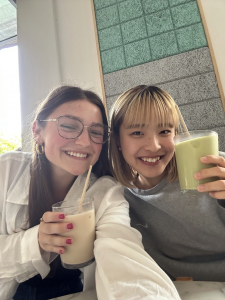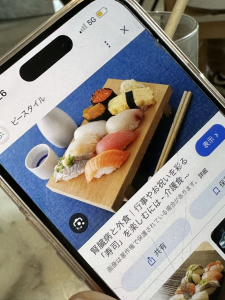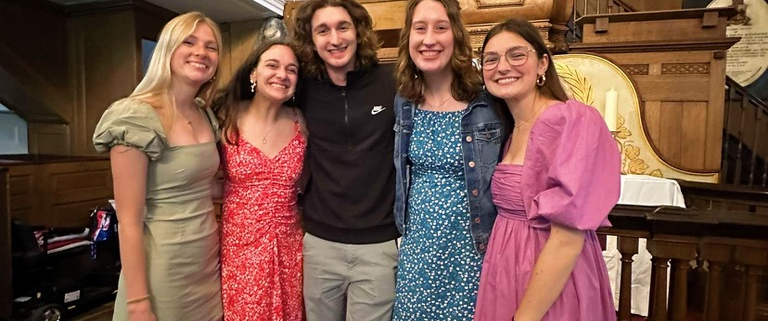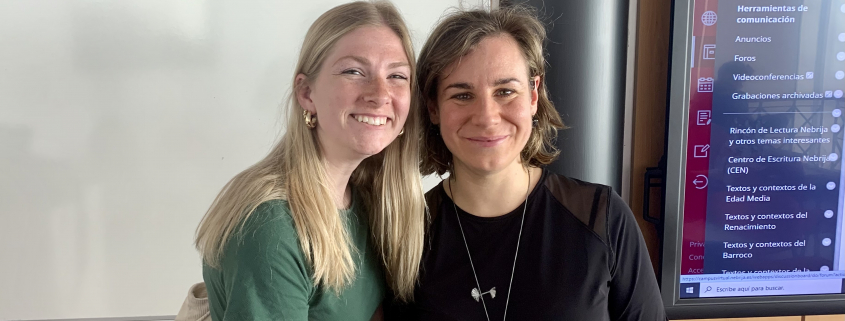Viajes Viajes Viajes – Edición España
/in Madrid Spring 2024-WiedoffBuenos Días 🙂
For this blog, we can choose what we want to write about! My first thought was to write about my travels here in Europe and Spain since I have not gotten to talk much in detail about them. I am very passionate about seeing the world and I prayed that I would get to see a bit more of it while I was here. One of my goals for my semester abroad was to travel around Spain and Europe in general. Before arriving in Spain, and during the first couple of weeks, I was a bit too ambitious with my hopes for traveling. I had a list of 10-plus countries I wanted to visit with the things I wanted to see and do in those countries. Now that I have spent about two and a half months here, I am thankful for the changes in my mindset about travel.
While I’ve been here, I have relaxed on trying to plan trips months in advance and instead have just let travels come up naturally. Plans change. There have been so many instances where my original travel “plans” got changed. At first, this stressed me out and made me worried that I would not LOVE what I ended up doing or where I ended up going since it was not part of my original plan. I can confidently say that I have not felt any regret about any of my travels. I have learned to take things a day at a time and see where prices fall and travel goals lie.
For this blog, I will focus on the trips I have taken so far, specifically in Spain. Keep your eyes peeled for a Part 2.
I’ve kept a daily journal of my time abroad so I thought it would be special to include some excerpts from my journal from each of my trips. Welcome to Alaina’s Travel Journal. 🙂
Toledo:
About a 40-minute train ride from Madrid stands Toledo, a city set on a hill above the plains of Castilla-La Mancha in central Spain. Toledo was the former capital of Spain and is known for having the three cultural influences of Christians, Muslims, and Jews throughout its city and history. Another fun fact is that the famous painter, El Greco, lived in Toledo for a time before he passed away.
My first trip to Toledo was with my program, ISA. This trip was on February 10th, about 7 days after we arrived in Spain!
Journal Entry:
“ONE WHOLE WEEK HERE, PRAISE GOD! Today we had our day trip to Toledo, Spain’s old capital, one of the oldest cities in Europe. It is about an hour bus ride from Madrid to Toledo. We left from the bus stop around 9:30 and arrived at 10:30. First, we stopped to pick up our guide and then went to a lookout point over Toledo to see the entire city. Wow…so, so breathtaking. It was super windy when we were looking over the city so some of the pictures we took were funny because our hair was all over the place. After the lookout point, we drove to the start of our walking tour. The first location we visited was called the Monastery of San Juan de Los Reyes, originally built for Isabel and Fernando to be buried in, but they later changed their mind and are instead now buried in Granada. The Monastery had a courtyard in the middle and it was so peaceful and beautiful. The sun was shining in the courtyard at the perfect time as we walked around it. When we wrapped up there, we walked and had a short break for a snack and coffee as well as a bathroom break. I walked over to another lookout point, snacked on some crackers, and stood there while people grabbed snacks. The next location we visited was the Synagogue of Santa Maria La Blanca. It looked more like a mosque but it was still very beautiful! We then headed to the Cathedral of Toledo. The view both inside AND outside was incredible. Everything is so detailed and hand-painted and carved. It just shows how much time, talent, and effort went into these beautiful structures. There was so much gold decor and so many beautiful paintings. We spent a long time in the Cathedral and then went to briefly see one of the most famous El Greco paintings, “The Burial of the Count Orgaz.”After, we walked to the square and split off for lunch. A group of us ate at a place called, “Nuevo Almacen.” Sarah and I split Croquetas de Jamon and Tacos de Costillas. They both tasted great! After lunch, we only had a bit of time to walk around in some shops so we wandered until it was time to meet back up with our group. The tiles around Toledo were so beautiful…”
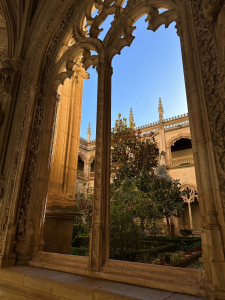
When my boyfriend, Dylan, visited Spain, we also took a day trip to Toledo. I loved this day even more than my first time going. There is something about the sun shining and being with one of your favorite people that just elevates experiences. 🙂
Journal:
“…We began our hike up to the viewpoint around 4:45. We took our time and of course, took photos on the way. While we were walking, we both saw this pretty green hill with a super cool view and we both said, “We NEED to climb it!”. (We did on the way down) Dyl was absolutely amazed, which made me smile. I was amazed too. The view was incredible and the the sun came out during “golden hour”, the hour before sunset. It was perfect. We spent a lot of time sitting and looking at the panoramic view of the city. I was so happy in that moment. <3”
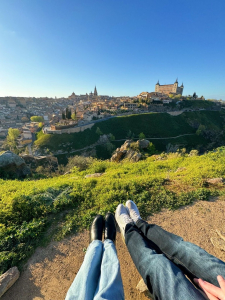
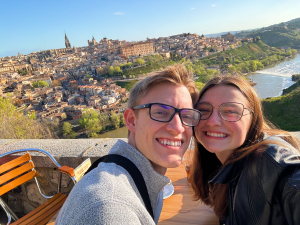
Segovia:
About 1 hour away from Madrid in the region, Castile-León, is the city of Segovia! Segovia is most widely known for the famous Roman aqueducts that have been standing since the 1st century. Spain’s last Gothic Cathedral is also located in Segovia, along with the Alcázar of Segovia.
On February 16th, Emily, Sarah, and I took a day trip to Segovia together!
From my Journal:
“Eeeeeek! Today was so so amazing and almost magical.”
“…After seeing the aquaducts, Emily and I wanted to find our old host Dad’s library shop, from the last time we were in Spain on a school trip. We did find it!!! We were hoping he would be in there but sadly, it was closed….”
“…After exploring around the Cathedral, we had our tour of the tower of the Cathedral at 1:30. There were 190 steps to go up. It was a very winding/small stairway. I was almost getting nauseous and dizzy in the stairs, but I knew it would be worth it. We had breaks along the way too. The last stop was the TOP. The bells were up there and a view of the city from every angle. It was so so amazing. We said, “is this even real?” SO MANY TIMES. I felt like I was looking out into a world from a fairytale….”
“…When we finished our tour of the Alcazar, we went to a place right next to it for churros with chocolate and a cappuccino. I need sweet things to drink, and it was not very sweet so I added chocolate when we were done using it for the churros. We were all SO giggly. We sat, talked, laughed, looked at the incredible views, and enjoyed each other’s company. Once we finished, we took our sweet, sweet time watching the sunset over the Alcazar, walking along the wall of the city. Today was the anniversary of Emily finding out she had cancer 4 years ago. I got emotional because, well, I have been with her through those years and more. It is so crazy to think how 4 years ago she was diagnosed with cancer, and now she is standing next to me, healthy and in remission, in a different country watching the sunset. God is good…”
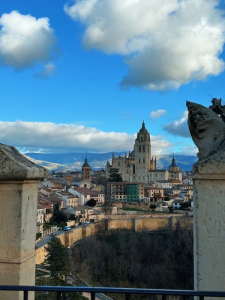
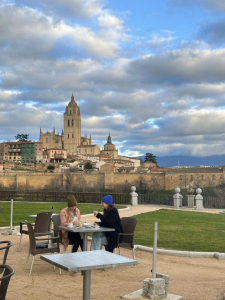
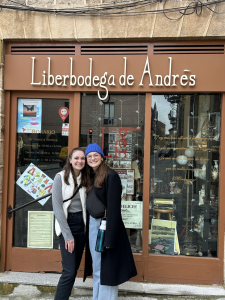
Tenerife:
Tenerife is one of Spain’s Canary Islands, located off the West Coast of Africa. It is known for its beautiful dormant volcano and beautiful beaches, natural pools, and mountains.
This was a trip that was planned VERY last minute, but we all made it work! Emily, Sarah, and I were in dire need of some SUN, so we planned a short weekend trip to the South of Tenerife. We flew to Tenerife, on Friday, March 15th, the day Dylan left Spain. We left Tenerife on Sunday morning, March 17th.
Journal:
“…After breakfast, we took our time and walked along the coast and ended up seeing a cool-looking cove with lots of flat rocks to lay on and a ladder to get out of the water. We were determined to find a way to get down there. There was another man who had the same idea….We laid in the sun and tanned (burned) for a while, soaking in the heat and sun we missed so dearly. It was so warm and SO beautiful. The water was SO blue. Before the man left, he approached us and asked us if we knew of any places to volunteer at, but we did not. The next thing we know, he was inviting us to his cave. Yes, you heard that correctly. We politely declined, and he left. We finally JUMPED in the Mediterranean! It was just us 3! The water was so cold, salty, and blue. When I jumped in, it was so refreshing. I could not help losing my breath because of how cold it was. After jumping in and treading water, I got used to the temperature. There is something kind of freeing and a bit scary (hehe) about swimming/floating in such a big body of water…”
“….We found the natural pools!! There were more people at the natural pools but plenty of space to lay out and jump in. Once again, the water was SO blue and clear. We jumped in, dove in, and had fun rising and falling with the tide. I really lived out my Mako Mermaid H20 moment….”
“…We took our ordered pizzas to the beach that was a 3 minute walk from our hostel and watched the sunset. We got a spicy pepperoni and BBQ and demolished them because we were so hungry. The sunset was pretty and it was calming to watch and hear the waves crashing into the shore….”
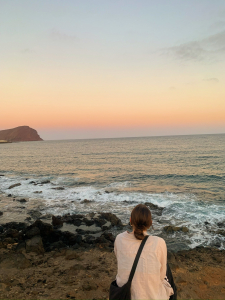
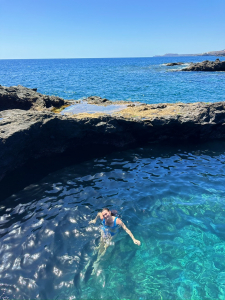
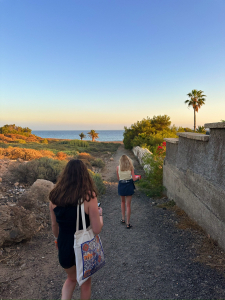
Granada:
Granada is a city located in southern Spain, in the region of Andalusia. Granada is located in the foothills of the Sierra Nevada mountains and is about a 40-minute drive from the beach as well! Those who live in Granada have the best of both worlds, mountains and the beach! Granada is most famously known for being the home of the Alhambra. The Alhambra, a palace and fortress complex, is one of the most famous monuments of Islamic architecture and one of the best-preserved palaces of the historic Islamic world. It not only has Moorish influence in it’s architecture, but also Christian influence. It is the most visited place in Spain.
Just this past weekend, our program took us to Granada! We left for Granada on Friday, April 12th, and arrived back in Madrid on the evening of Sunday, April 14th.
Journal:
Friday Night:
“…At 5:30, we began one of our activities with our program. We walked through the Albaicín neighborhood, a Moorish quarter and the oldest neighborhood in Granada. We walked through these streets up to a viewpoint of the Alhambra. The view was so beautiful as the sun was beginning to set, and the lights of the Alhambra turned on. There was also people clapping and singing, playing live music. We walked to the Flamenco show. It was super cool and I love Flamenco, but if I am being honest, I liked the one I saw in Madrid more. There was an elderly lady who danced and made jokes about being the oldest Flamenco dancer. She was very impressive for her age….”
Saturday:
“…It was so beautiful there. The gardens and the views of the city are my favorite part of the Alhambra. I also love all of the details and the differences in architecture. Because we went in bigger groups, we did not have much time to explore on our own, which made me sad because I love taking my time in places like that. I loved the Summer Palace. After our tour was finished, Sarah and I asked if we could stay and explore more, and the guide said we could! She and I walked back to the Summer Palace and just took it all in and slowly walked through it, looking at all of the flowers and detailing of the tiles. Sadly, we were unable to find the entrance to the other garden and decided to get lunch instead since we were very hungry. I hope to take more time there when I come back with my family at the end of my program…”
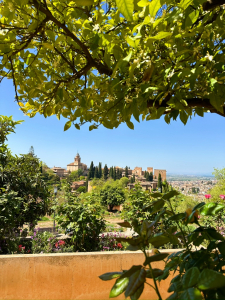
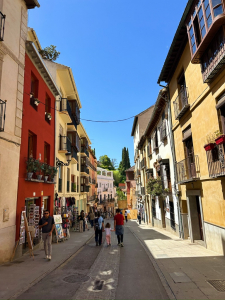
Travel Plans for Valencia, Barcelona, and Mallorca:
I have not yet traveled to these places, but it is my plan! I will be taking a solo day trip to Valencia this Saturday and Sarah and I will be going to Barcelona and the Spanish island, Palma de Mallorca over our break at the beginning of May. I was really hoping I could travel to the North of Spain but it fell through because of money, travel, and accommodations.
Spain truly is a beautiful country and I adore Madrid. That is why I have been very content to keep exploring Madrid and Spain on the weekends we have left. Time has flown by and I am so grateful for every opportunity to travel and see more of God’s creation.
Con Amor,
Alaina Wiedoff
Fellowship in London
/in Madrid Spring 2024-HoffeBecause of Holy Week here in Spain, Alaina and I had about ten days to travel to Europe during the break. During that time, we visited Paris, Amsterdam, London, and Edinburgh. It was a lot to fit into that short period of time, but I thoroughly enjoyed every city and country we went to. I could go on and on about the experiences we had, but with this blog, I would really like to focus on the church service I went to in London and just how much I appreciated being able to worship with my brothers and sisters in Christ.
I won’t lie; it has been a challenge for me to go so long without attending church. Yes, I watch some live-streamed services, and doing daily devotions has helped me develop good habits, but I miss fellowship and communion and all of the amazing things that worshiping at church offers.
Amidst planning for spring break and deciding which places we should visit, London was not originally very high on my list. I had heard great things about it, but I felt no sense of urgency or strong desire to go there. Alison Foxen, an MLC student currently studying there, mentioned that the mission church located in London was having an Easter service to celebrate Christ’s resurrection. It didn’t take long for our “study abroad squad” to decide that we all wanted to meet up in London for spring break to celebrate Easter Sunday together.
It was truly a blessing that all of us studying abroad were able to make it for Easter Sunday. We came from all over Europe to worship together. I loved catching up with everyone and hearing about their experiences. We toured London together and enjoyed each other’s company after not seeing one another for such a long time. This experience has really brought us closer together.
Before church, we all got breakfast together at a quaint cafe, then headed to the church where the WELS mission was holding the service. It was an old German church in London with a great location. There were so many people there! I had not expected so many people to be there since it is a fairly new mission, but the church felt full 🙂 I met new people as I had some refreshments before the service started. It was so refreshing to talk to people about Jesus who shared the same Easter excitement as I did.
As for the service itself, I was overwhelmed with joy at hearing the gospel message while being surrounded by fellow believers. The Pastor preached a wonderful sermon, and the Easter hymns we sang brought me to tears. I missed this. There was even a trumpet! We took communion as well, which was so nice since it had been so long since I had been blessed to do that. I cherished every part of the service and was thankful that I was able to go. Even after the service, we stayed around before our train left to talk to the members there.
I worried before leaving for Spain how it would affect my faith life. I knew that church was such a strong way to strengthen my faith, so what would happen after months of not attending? Being here has made me much more intentional about seeking out God’s Word in my free time, such as doing daily devotions. At MLC, I attended chapel, went to church, and heard about God’s promises in my classes. It was structured for me, so I did not feel the strong need to do my own devotions or go out of my way intentionally to study God’s Word. That was an immature way of thinking, as I have now learned the importance and richness of a personal devotional life. I would not say that I took church or being surrounded by fellow believers for granted before arriving in Spain, but I do think that I have a greater appreciation and love for them now. I can not wait to go to church when I get home 🙂
Despite the challenges that being away from MLC and my home congregation has brought me, I thank God that he used this experience to strengthen my faith. He blessed me with resources that I have at my fingertips to dive into God’s Word and study it. He blessed me with the opportunity to worship in His house on Easter Sunday, even though I was thousands of miles away from my home church. God has blessed me abundantly!
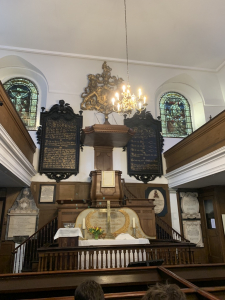
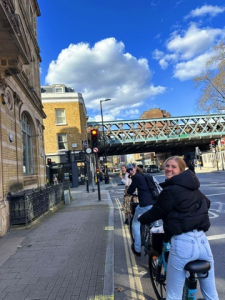
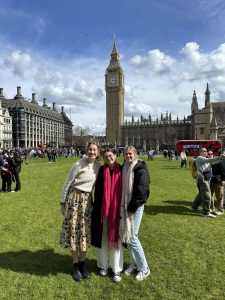
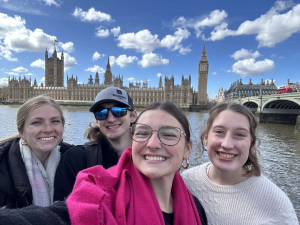
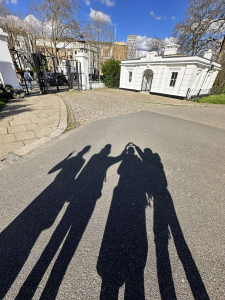
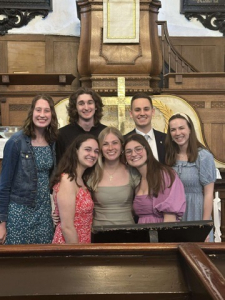
Bridging Two Cultures
/in Madrid Spring 2024-HoffeLiving in Spain has taught me many things about Spanish culture, but also about my own and how it may appear to people of other cultures. I had the wonderful opportunity to interview one of my Spanish professors, Ana, who has several years of experience with both the American and Spanish cultures. It was very eye-opening to see my own culture through her eyes and learn more about hers.
Some questions I asked her were about the roles of men and women, her religion, her views on her American students, stereotypes, and much more. Here are a few things I found especially interesting.
Religion: I was curious about her religion since I had previously been told that Spain is primarily Catholic. She mentioned that she has never been baptized or gone to church in her entire life. She commented that this is unusual for Spaniards because most begin their lives in a Catholic church but eventually leave. I was sad that she was not familiar with Jesus’ love for her and had never experienced or heard of the good news of the Gospel, but she was so respectful of all religions and beliefs. This also gave me the brief opportunity to share what my faith was all about. Though brief, I was thankful for the opportunity to tell her about Jesus before moving on to the next topic.
Spanish Stereotypes: One of the first questions I asked Ana was, “What are some stereotypes that you think people have about the Spanish culture?” Her immediate response focused on the Siesta Hora. “Some people think we as a culture are lazy because we build naps into our schedule, but I think it encourages us to be even more productive. Everyone thinks that we are last-minute people, never planning ahead or anything. And while that may be true for some, I love planning ahead and being prepared. Also, being able to work well under pressure and on-the-go is a good trait to have. I see it as a skill.” This is a rough translation since we were speaking in Spanish, but I loved her take on it. I could clearly see that it frustrated her to be grouped into one perspective that believes they all are lazy and never plan. She said she identifies with none of those things. While it is true for some (in any culture), it is not true for everyone. After living in Spain for a couple of months now, I have learned to love the siesta hora. It has also challenged me to be more flexible and “go-with-the-flow.” I don’t have to plan everything out weeks in advance to be organized. I have grown a lot in the sense that I am learning to be okay with last-minute changes and spontaneous plans. I really do appreciate that about the Spanish culture.
American Stereotypes: When I asked what she thought about American culture and some stereotypes that come along with it, I prepared myself for answers such as “They are loud, disrespectful, and have no culture.” However, I was very surprised at her response. Yes, she did compare us to Barbie dolls living in our dream world full of opportunities, but she had so many kind and admirable qualities that she mentioned. For example, she loved that we are so “practical” and focused on the future. She often gets frustrated with European culture, which is so focused on tradition and the past, in her words. Ana had the opportunity to live in the United States and learn English, so she came to have an appreciation for the way America operates. Now that she is living in Spain again, she misses certain aspects of American culture, such as the efficiency and practicality of our way of life. She loves the warm and welcoming personalities of Americans (in general) because it reminds her of her own Spanish culture. She has been teaching international students for many years now, so I asked her about the differences in culture within the classroom. Ana told me about Spanish classroom etiquette, where the teacher speaks and the students listen. The teacher is respected and viewed as above the students. She has noticed that American students like to challenge the teacher and discuss material, something that Ana really appreciates and enjoys. However, American students yawn, eat, stretch, and drink during lectures – all things considered rude in Spain. Overall, Ana’s view of America was overwhelmingly positive, much to my surprise. I loved hearing her perspective and kind words that seemed to bridge our two cultures, showing me that we really are not that different from one another.
One comment that Ana made about Spanish culture is, “We are a country of extremes. You are either with me or against me.” In one sense, it reminded me of the politics in the United States. Everyone seems to be against each other and is very opinionated. In a different sense, the people in Spain are a little more respectful when sharing their opinions on politics, according to Ana. Politics are not often discussed with people who you don’t know very well.
Finally, from one teacher to another (future) teacher, I asked her if she had any advice. Personally, I have been struggling with the idea that maybe I am not meant to be a teacher. I have an interest in so many things that it is hard for me to see myself only being a teacher. Ana gave me great advice. There is a phrase in Spanish, “Las personas son el fin, no el medio.” This was saying that people are the goal, not just the means used to get something that we desire. People are the best possible outcome, not to be used to our advantage. This is why she is a teacher now. She loves creating relationships with students and learning from them. Creating connections with them is why she wants to continue being a teacher. She told me that everyone is different and everyone has something unique to add to their lives. I loved her perspective on this. Ana told me that even though I am unsure of what my future career will be, always to keep learning. Learn from being a teacher, learn from students, learn from any and every experience that I have. As a literature teacher, she also told me to keep reading 🙂
Interviewing Ana was definitely the most beneficial learning experience I have had since arriving in Madrid. I learned things that can’t simply be taught in books and classes but can only be learned from talking to people of different backgrounds and cultures. Not only did I learn so much about my own culture and the Spanish culture, but I was able to make a lasting connection with my professor, Ana.
Fearful, Faithful, Forgiven
/in London Spring 2024
John 16:33 “I have told you these things, so that in me you may have peace. In this world you will have trouble. But take heart! I have overcome the world.”
This bible passage gives us comfort in our lives. This world is full of sin, evil, and despair. Every single one of us goes through our own hardships and trials in life. However, peace can be found despite all the chaos in this world. Jesus is that peace. Only through Him can we find comfort in our lives. Jesus carried the weight of the world so we didn’t have to. What an immense blessing and relief in our lives!
My day-to-day faith life has taken a different shape than it did back in the States. While at MLC, I am blessed to have the opportunity to worship in Chapel twice a day. I am constantly surrounded by other like-minded Christians who are all preparing for the public ministry with me. Religion classes, bible studies, and Sunday worship are all other parts of my life at MLC that I used to participate in on a weekly basis. Having that aspect of my life disappear while I am abroad has been an adjustment.
I used to take the blessings of attending Chapel, bible studies on campus, and being surrounded by like-minded Christians for granted daily. It was something that I had been used to and exposed to my whole life; I didn’t know anything else. I appreciate the blessings of fellowship and group worship now more than ever.
While abroad, I have continued to grow in my faith. I strive to do my personal devotions every morning when I can. Once in a while, I stream church or chapel services online. I am also blessed with the opportunity to worship at the WELS mission church, Holy Word, while here in London. Worshiping with Holy Word has given me a different perspective of ministry actively at work. During my time here, I have watched part of the behind-the-scenes work Holy Word has accomplished and continues to plan out. Rev. Dr. Michael Hartman and Rev. Conifer Berg continue to work daily to help this mission grow. I love seeing that every person in the congregation works together to develop plans and supports one another through this process.
In London, I have been exposed to many evangelism opportunities. Most of the friends I have made during my time here are not Christians and do not take part in any religious practices. I have shared my faith with them and explained my religious beliefs. I have also noted the differences between MLC and all the public Universities they attend back home. They are always fascinated by hearing how the WELS call system works. Though none of them have expressed a huge interest in Christianity, they all respect my beliefs and continue to let me talk about it. They also take note of differences in the way I live my life as a Christian, such as my views on swearing, drugs, and dating. I am glad to see how my Christian light is being noticed. The most I can do is share my faith and the gospel with them; the rest is up to the Holy Spirit.
It is also fascinating to see the religious practices here with the Londoners. In general, religion is lost in many people here. Most people don’t know who Jesus is and have little background knowledge on what the Bible teaches. People focus their time and energy on their personal lives and jobs instead. The people that do attend church mainly attend the Anglican church. Two of my British flatmates attend this type of church. The Church of England focuses mainly on the joyful feeling people receive while being Christian over the accurate biblical truths in Scripture. The Bible is completely lost in most services. Many Brits even believe that parts of Harry Potter and The Hunger Games reflect biblical truths from the Bible. I am aware more than ever of how lost people truly are. Jesus is the only path that leads to true peace and hope.
Prayer is an excellent tool I use daily. God hears and answers our prayers. We have to trust Him and His will. Everything will work out according to His timeline and plan. I continue to pray for strength while I am here, and that God will work His way into the hearts of those who are lost. This study abroad experience has prepared me more for ministry and sharing the gospel. At MLC, we talk a lot about what to do in evangelism and mission situations; however, nothing can prepare you for how to share the Bible in real-world situations until you actually experience it. Experiences teach us our strengths and weaknesses, and help us reflect on what we learned. I am thankful for the past few months here, and I pray that the rest of my time in London goes smoothly.
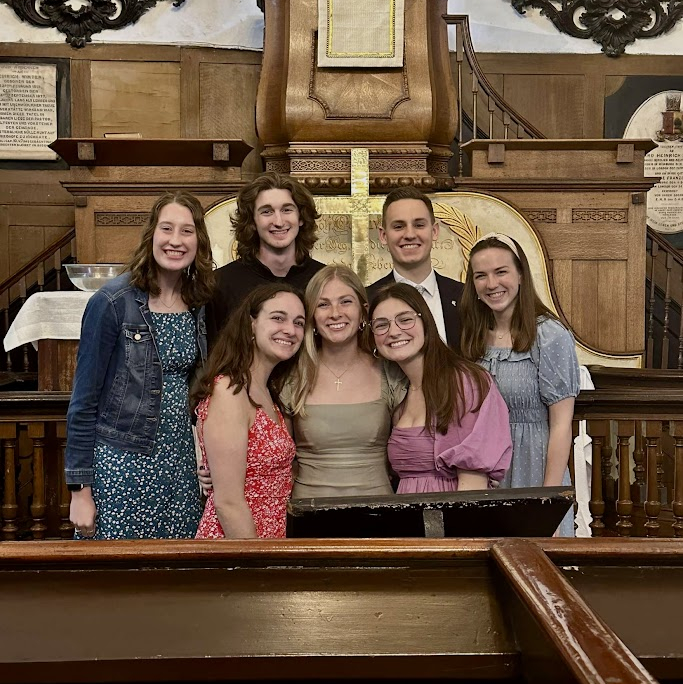
Easter Sunday at Holy Word
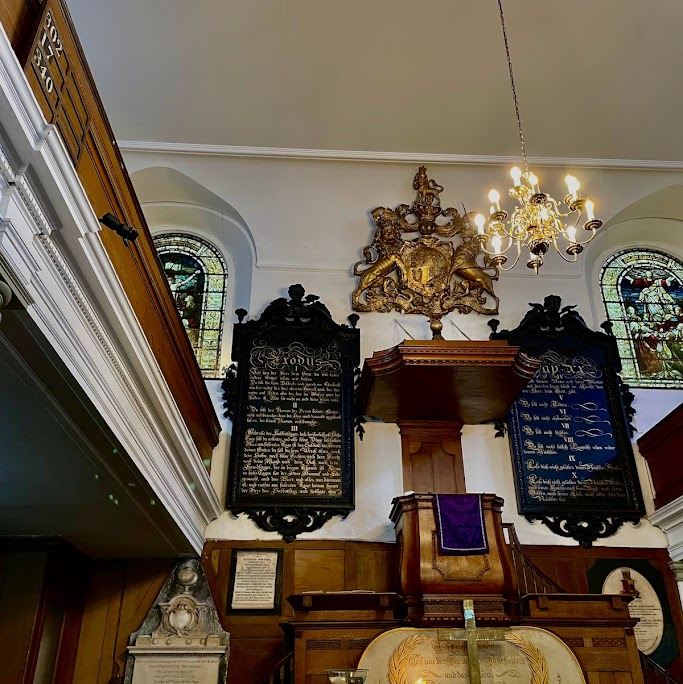
Holy Word is using this location in Central London for worship
Till we meet again,
Alison Foxen
Connections Around the World
/in Madrid Spring 2024-Wiedoff
Hola!!
For our blogs this week, we had the unique opportunity to get to have a conversation with someone from another culture. Honestly, I was a bit nervous at first but I knew it would push me outside my comfort zone AND be a worthwhile experience getting to know someone new. This is a bit of a longer blog because I did not want to leave anything out, so thank you for the time you spend reading this! 🙂
There is a girl who is in two of my four classes, whom I’ve made small talk with but haven’t put in the effort to get to know. Her name is Hatsune and she is from Japan! What a sweet and kind girl! I am so thankful I got to know Hatsune better AND got to learn more about her culture.
Hatsune and I met up at a coffee shop and talked for an hour and a half, both about the questions I had wanted to ask her about Japan and getting to know one another better. Something really cool about the conversation we had was that we did it all in Spanish! Her first language is Japanese, and mine is English, but we were able to meet in the middle, and we communicated best in Spanish.
I came prepared with some questions to ask her, some that I came up with on my own and some from a good friend who is studying in Ireland. 🙂
Hatsune Arima is 21 years old, born in 2002 in Tanegashima, Japan. She lived in her home city, Tanegashima, for 18 years of her life but when she attends her home university, she lives in Osaka. Hatsune attends a school in Osaka that has a specific focus on cultures and languages. She is spending a year in Madrid to continue her studies in Spanish. I am always curious to know why people choose to study what they do, so I asked her why she chose Spanish. She told me that when she was younger, in primary and secondary school, it was mandatory to learn English, “la primera lengua del mundo.” (The first language of the world) She spent lots of years learning English so when she began her studies at her university, she had a choice of what language she could learn. Hatsune found so much interest in the history, language, stories, and culture of Spanish-speaking countries. She stated, “Me interesa mucho el español.” It is very evident to me that she loves the culture and the language because of her abilities to speak Spanish as a third language, her interest in cultural activities, and her dedication to stay in Madrid for a whole year!
I was curious to know a bit more about what makes Hatsune, Hatsune! 🙂 In order to do so, I asked questions about her family, her childhood, her interests, and her values!
Hatsune described that she has one sister, Hibiki, who is just about a year younger than her (20 years old). Her parents live in a different city now called Kagoshima, which she visits on occasion. Her parents both are 41 years old and “muy amable.”(Very kind)
When I inquired about the values her family holds, she described how they frequently engage in various activities together, which reflects a common cultural practice in Japan. For example, she said that when it came time for meals her family would eat together, including her grandparents. She also said that when it came time for “excursions” outside of the house, they would always go together, whether this meant a walk in a park, eating in a restaurant, shopping, and more. It is so special when certain cultures value family time to this extent because they can be such influential and important relationships in a person’s life. Hatsune also talked about respect. Respect is a significant value she holds, for her family, others, and especially elders. One important memory that she talked about from her childhood was spending time in her favorite place with her family. She described it as this, “Era una pequeña isla, lejos del centro de Japón con mucha naturaleza, tanto bosques como playas. Nos encantó llevar a nuestros perros a pasear por la playa juntos.” (It was a small island, far from the center of Japan with lots of nature, both forests and beaches. We loved taking our dogs for walks on the beach together.) I could see how meaningful these memories were to her because of how she spoke with such a loving and reminiscent tone.
Some of Hatsune’s interests include: watching videos/shows on Youtube and Netflix, going to cafes to sip on a coffee, reading, and going to museums to look at paintings. She also described how she loves spending time with her friends and making new ones. She loves the Japanese music artist, Shimizu Shota, and loves the song sung by him called, “My Love.”
To my understanding, she does not work during the school year but described how she sometimes works with her Mom at a supermarket when she returns home during university breaks. I asked her about what her dream job would be and she responded, “El trabajo de mis sueños sería trabajar para un agente de viajes y planificar viajes o trabajar en un café con mis mejores amigos.” (My dream job would be to either work for a travel agent and plan trips or work in a cafe with my best friends.) It was so sweet to hear how much her friends mean to her as well as how much she adores traveling and learning about the world. I relate 100%!
When I asked her a bit more about her education experience growing up, she said she does love her academics currently because it is so focused on learning the Spanish language and more about the culture, which includes meeting lots of new people. I asked her, “¿Cuál fue tu año favorito de la escuela y qué lo hizo tan especial?” (What was your favorite year of school and what made it so special?)
Hatsune responded by saying, “Mi año favorito de la escuela fue el segundo año de la escuela secundaria. Yo era miembro del equipo de béisbol. Mi papel era apoyar a los jugadores y ayudarlos en lo que necesitaran. Tenía que ir todos los días para estar con este equipo y fue muy duro, pero muy divertido. Este mismo año, también fui a Singapur por 2 semanas y era la primera vez que era extranjera. En cada “zona” de Japón, eligen a la gente para ir y a mí me eligieron. También tuve el papel de ser el presidente estudiantil de mi escuela. Aprendí mucho y estuve muy ocupado.”
Translation: (My favorite year of school was the second year of high school. I was a member of the baseball team. My role was to support the players and assist them whatever they needed. I had to go every day to be with this team and it was very hard, but very fun. This same year, I also went to Singapore for 2 weeks and it was my first time being a foreigner. In each “zone” of Japan, they pick people to go and I was chosen. I also had the role of being the student president at my school. I learned a lot and was very busy!)
I asked Hatsune if she had a religion or what her religion was. I wanted to ask this question, but in the most respectful way possible, so I told her that if she did not want to talk about it, we did not have to! She explained that she currently does not practice any religion, but her family follows Buddhism, which they also adhered to during her upbringing. I pray that as Hatsune and I spend more time together, I can share Jesus with her.
MORE SPECIFIC TO CULTURE:
Many of my questions were focused on getting to know Hatsune, which certainly plays a part in the meaning of her culture. I did ask some more questions specific to her culture to which she happily responded. 🙂
Here are some of the questions we talked about and her responses:
(I will translate for those who do not speak Spanish) 🙂
What is considered the most respectful and disrespectful in your society?
“It is disrespectful to talk to elders in a way that is rude and well, disrespectful. Here, there are different ways to talk to those who are older than you. In general, Japanese are very respectful to those who are older than them, but the elderly have the utmost respect.”
“It is also very disrespectful to be loud on public transportation. It is usually silent. If anyone every visits, they should have their sound off and do not make calls. It is to respect those around us.”
After our meeting, I looked up a bit more about this and I read that when speaking to an elderly person they add an extra element of respect by adding their “san” (similar to Mr. or Mrs.) after their name. They also use a certain way of communicating politely called “keigo”. I believe “keigo” is what Hatsune was describing in Spanish.
What is your favorite food from your culture? Snack? Drink?
“My favorite food is sushi, but sushi normal. It is more common in Japan. There are various types of fish with rice. I understand that it is different from what “sushi” in America looks like. My favorite snacks are sweets, especially chocolate cookies or cheesecakes. My favorite drink is matcha. When I was growing up, my family would always have another kind of tea called, “Oolong tea” so I would drink that often as well.”
Hatsune showed me a picture of the kind of sushi she loves and I took a picture so I insert it into my blog!
What is your opinion of the United States? Are there stereotypes that you believe to be true?
“The United States is a very big country and is a very free country, with lots of freedoms. There is a variety of people there of different nationalities and is more generous than other countries. In the minds of some older people from Japan, I think the United States does not have a good impression because of our history. The younger generation has a better impression.”
“The stereotypes that Japan has about America are, Americans love to talk and are very fun, but are a bit loud at times. It really depends on the person you talk to.”
“I think that our stereotypes include being very quiet, we do not talk a lot nor express our emotions well, and we have high respect for elders.”
What is the role of women in your society?
“Women do work more than they did in the past but there is still a bit of inequality between men and women. Many women are at home to take care of the children and the home but it is better than before.”
What is a celebration very important in your culture? Can you describe it to me?
“Japanese New Year! Many people will go to a temple or shrine every year on the first day of the January. People whose religion is Buddism go to a temple but people who have the Shinto religion go to a shrine. There, they pray for and wish for good luck for the year they are entering. We also go to the cemetery to begin the New Year with our ancestors. Another celebration that is connected with the New Year takes place on August 13th through 15th. This celebration commemorates and remembers deceased ancestors. It is believed that their spirits return at this time to visit relatives. People take the candles or lanterns to the graves of their families and bring them back to their home to call their ancestors home.”
The final question I asked Hatsune was this:
¿Cómo está estudiando en Madrid dando forma a tu visión del mundo?
(How is studying in Madrid shaping your view of the world?)
She responded, “Mi visión del mundo se ha abierto mucho desde que llegué a España. Me interesan más las culturas de los extranjeros y también las relaciones internacionales. Vivo con una chica española y otra americana, así que ha sido una buena experiencia aprender sobre las diferencias entre las tres culturas.”
(My vision of the world has opened up greatly since I arrived in Spain. I am more interested in the cultures of foreigners and also international relations. I live with a Spanish girl as well as an American girl, so it has been a good experience learning about the differences between all three cultures.)
Hatsune graciously agreed to meet with me and tackle questions that prompted deeper reflection than she initially anticipated. Several moments during our conversation left me pleasantly surprised, exclaiming, “Wow, that’s fascinating!” or “I had no idea”. This experience highlighted the potential for personal growth through expanding my understanding of the world and different cultures, demonstrating how informal discussions can foster significant development. What a testament to the incredible diversity and beauty of the world and those in it, created by our Savior.
